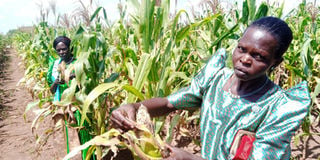Prime
UN calls for rural food production

Locals at a food security farm in Ngetta Zonal Agricultural Research and Development Institute in Lira City on December 16, 2022. Photo | Bill Oketch
What you need to know:
- Mr Lario said he would rally massive scale-up of investments in agriculture, and long-term rural development from governments, investors and private companies with a view to ensuring food sovereignty.
The president of the UN’s International Fund for Agricultural Development (IFAD), Mr Alvaro Lario, has called for long-term rural development to prevent recurring food crises.
“If this is done, it will end hunger and poverty in countries that are currently experiencing acute food insecurity,’’ Mr Lario said in a statement on Friday ahead of the annual gathering of world leaders in Davos, Switzerland, next week.
“We should not have to see countries experiencing acute food insecurity over and over again. Extraordinary times call for extraordinary measures. We must take immediate and concrete actions to strengthen our failing food systems - this requires strong commitment and bold investment,” he added.
Mr Lario said he would rally massive scale-up of investments in agriculture, and long-term rural development from governments, investors and private companies with a view to ensuring food sovereignty.
“The only long-term investments in rural economies can provide long-lasting solutions to hunger, under-nutrition and poverty. This is what will enable small-scale farmers to increase local production, better adapt to climate change, build short and local food chains, build and sustain local markets and commercial opportunities, and create small rural businesses. This approach makes a lot of economic sense,” the IFAD president said.
According to World Bank research, growth in agriculture is two to four times more effective at reducing poverty than growth in other sectors. Today, the world is experiencing an unprecedented food crisis due to the convergence of high food, energy and fertilizer prices linked to the war in Ukraine, and several climate shocks.
The number of people facing acute food insecurity soared - from 135 million in 2019 to 345 million in 2022, according to UN estimates. A total of 49 million people in 49 countries live on the edge of famine. One person in 10, about 828 million people, is currently suffering from hunger defined as chronic undernourishment. In addition, almost 3.1 billion people cannot afford a healthy diet.
Increasingly world food consumption is concentrated on three main crops (wheat, maize and rice).
An estimated 45 million children suffer from acute malnutrition, 149 million children have stunted growth and development due to a chronic lack of essential nutrients in their diet, while 39 million are overweight.
Disturbingly, in the years to come, extreme weather events will likely increase in frequency and magnitude, according to the Intergovernmental Panel on Climate Change (IPCC). Global food systems are at increased risk of disruption, with potential supply shortages and price hikes.
As the world becomes more fragile, Mr Lario says strengthening local resilience, and ensuring local production and well-functioning markets will become increasingly vital. Part of the solution also lies in supporting indigenous cropping systems, agro-ecology and reducing food waste and loss which represents about one third of the food produced today.




